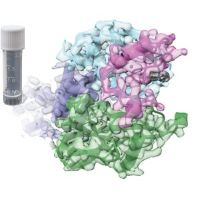Specification
| Description | Recombinant protein from the full-length sequence of Homo sapiens glutathione S-transferase omega 2 (GSTO2), transcript variant 1 (NM_183239). |
| Organism | Homo sapiens (Human) |
| Expression Host | Human Cells |
| Tag Info | His or DYKDDDDK. Please contact us if you need further information or require specific designed tag. |
| Purity | Greater than 90% by SDS-PAGE gel |
| Uniprot ID | Q9H4Y5 |
| Entry Name | GSTO2_HUMAN |
| Gene Names | GSTO2 |
| Alternative Gene Names | |
| Alternative Protein Names | Glutathione S-transferase omega-2 (GSTO-2) (EC 2.5.1.18) (Glutathione S-transferase omega 2-2) (GSTO 2-2) (Glutathione-dependent dehydroascorbate reductase) (EC 1.8.5.1) (Monomethylarsonic acid reductase) (MMA(V) reductase) (EC 1.20.4.2) |
| Application | Antigens, Western, ELISA and other in vitro binding or in vivo functional assays, and protein-protein interaction studies; For research & development use only! |
| Buffer | Purified protein formulated in a sterile solution of PBS buffer, pH7.2, without any preservatives |
| Endotoxin | Endotoxin level is < 0.1 ng/µg of protein (<1EU /µg) |
| Length | 243 |
| Molecular Weight(Da) | 28254 |
| Protein Sequence | (The sequence of expressed protein may have some variation from the sequence shown below. Please contact us for the exact sequence.) MSGDATRTLGKGSQPPGPVPEGLIRIYSMRFCPYSHRTRLVLKAKDIRHEVVNINLRNKPEWYYTKHPFGHIPVLETSQCQLIYESVIACEYLDDAYPGRKLFPYDPYERARQKMLLELFCKVPHLTKECLVALRCGRECTNLKAALRQEFSNLEEILEYQNTTFFGGTCISMIDYLLWPWFERLDVYGILDCVSHTPALRLWISAMKWDPTVCALLMDKSIFQGFLNLYFQNNPNAFDFGLC |
Background
| Function | FUNCTION: Exhibits glutathione-dependent thiol transferase activity. Has high dehydroascorbate reductase activity and may contribute to the recycling of ascorbic acid. Participates in the biotransformation of inorganic arsenic and reduces monomethylarsonic acid (MMA). {ECO:0000269|PubMed:15970797}. |
| Pathway | |
| Protein Families | GST superfamily, Omega family |
| Tissue Specificity | Expressed in a range of tissues, including the liver, kidney, skeletal muscle and prostate. Strongest expression in the testis. {ECO:0000269|PubMed:12618591}. |
QC Data
| Note | Please contact us for QC Data |
| Product Image (Reference Only) |  |

